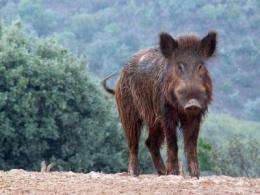Changes in land use favor the expansion of wild ungulates

Mediterranean landscapes have undergone great change in recent decades, but species have adapted to this, at least in the case of roe deer, Spanish ibex, red deer and wild boar. This has been shown by Spanish researchers who have analysed the effects of changes in land use on the past, present and future distribution of these species.
"In the last few decades there has been an increase in the area of distribution of wild ungulates", explains Pelayo Acevedo, lead author of the study and researcher in the Department of Animal Biology at the University of Málaga, speaking to SINC.
The study, which has been published in Landscape Ecology, considered the changes with time of the structure of the landscape and how these variations affect the distribution in the past (the 1960s), present (1990s) and future (about 2040) of roe deer (Capreolus capreolus), Spanish ibex (Capra pyrenaica), red deer (Cervus elaphus), and wild boar (Sus scrofa), in Andalucía.
According to Acevedo, wild ungulates were more limited in the past than they are at the moment. "The environmental favourability obtained from our models for the present is more widely distributed than that from our models for the past", asserts the researcher. The current expansion of wild ungulates is also occurring in the rest of Europe, but unevenly, depending both on the species and the country.
Change in land use seems to have been decisive in the expansion of all the species studied, but "it has not been the only factor". In the case of some species, like the red deer, the expansion has been "a process accelerated by human intervention", say the authors. Nevertheless, anthropogenic activity has not affected them all equally.
"The expansion of these species in recent decades in Spain is also related to official protection measures, above all those intended to regulate hunting pressure, and, to a lesser extent, human mobility", the study points out.
A long-term expansion
The results suggest that the changes in land use of recent decades are "at least partly responsible for the current expansion of wild ungulates", affirms the researcher. If the current trend is maintained, we can expect that these species, except the Spanish ibex, will continue increasing their range of distribution in the near future in Andalucía.
According to the scientists, the areas currently deemed to be "favourable" for the distribution of these animals will remain favourable in the future. Apart from these zones, "we expect that new favourable areas for these species will appear", affirms the author.
Given that wild ungulates seem likely to continue their expansion in the 21st century, the research team proposes that we improve our knowledge of them to assure their survival, and that of their environment.
More information: Acevedo, Pelayo; Farfán, Miguel Ángel; Márquez, Ana Luz; Delibes-Mateos, Miguel; Real, Raimundo; Vargas, Juan Mario. "Past, present and future of wild ungulates in relation to changes in land use" Landscape Ecology 26(1): 19-31, 2011. DOI 10.1007/s10980-010-9538-2
Provided by FECYT - Spanish Foundation for Science and Technology


















